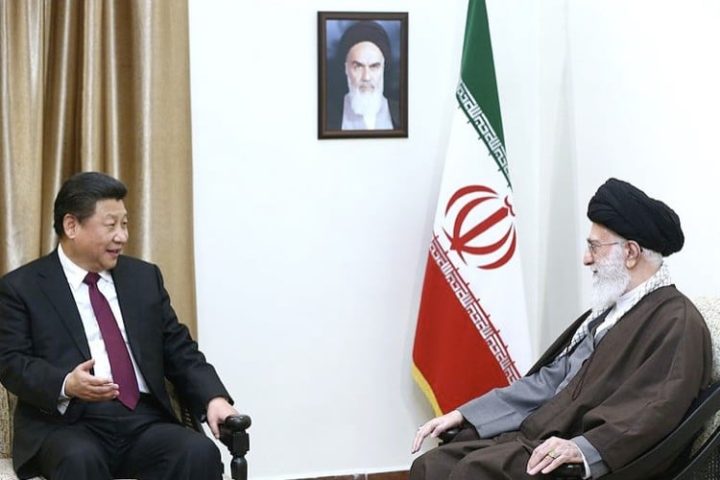
Today in Austria, the United States was set to start talks with Iran, China, Russia, and EU negotiators aimed at salvaging an international agreement on Iran’s nuclear program, which Washington withdrew from in 2018.
Joe Biden pledged to return to the 2015 agreement, known as the Joint Comprehensive Plan of Action (JPOCA), which was supposed to ensure that Iran never developed a military nuclear program and was often touted as a “huge part of Obama’s legacy,” as a “model for nuclear diplomacy,” and a “triumph of diplomacy.”
Both sides downplayed the meeting and didn’t expect much progress, and the preliminary results proved to be discouraging. The United States was ready to relieve some of the sanctions on Iran, in exchange for asking Iran to halt some of its nuclear development, but the government of Iran decided it would not engage the United States in negotiations. “No negotiations will take place between the representatives of Iran and the United States,” Iranian government spokesman Ali Rabiei told reporters today. Previously, the Iranians have made clear that they want all sanctions removed before talking. It unequivocally demanded that the United States “fully and immediately implement all of its obligations under the accord and abide by UNSCR 2231” — meaning lifting all of the crippling sanctions imposed by Trump, with no concessions from Iran, before starting any further talks.
As the United States dances around Iran, trying to persuade it that “orange man bad” is gone, and we can be partners again, flag-burning, Western-hating Iran is making new friends in the region. As the ancient saying goes, “The enemy of my enemy is my friend.” One country that shares the same anti-American passion as Iran is China.
Just recently, on March 27, Iran and China signed a 25-year strategic agreement dubbed the Comprehensive Strategic Partnership. An agreement between the oil-rich and regionally influential Islamic Republic of Iran and the economically powerful People’s Republic of China poses a new strategic challenge in the Middle East for the United States and its allies.
Even though full details of the agreement are not disclosed, it has been revealed that it covers a variety of economic activities from oil and mining to promoting industrial development of Iran, to transportation and agricultural collaborations and military agreements worth $400 billion. The accord brings Iran into China’s Belt and Road Initiative, a multi-trillion-dollar infrastructure scheme intended to stretch from East Asia to Europe and that would expand China’s economic and geopolitical influence.
Together, China and Iran will try to undermine U.S. global dominance through weakening its positions in the region. In order to achieve that, China staunchly champions the Iran nuclear deal, and Iran firmly supports China in issues related to China’s sovereignty.
As reported by The China Daily, during the signing ceremony, China’s State Councilor and Foreign Minister Wang Yi blasted the United States, saying unilateral sanctions imposed upon Tehran “violate international law” and harm “innocent Iranian people.” China is ready to work with people of various countries, including Iran, to oppose “hegemonic, bullying behaviors and champion the fundamental norms of international relations,” he said. He called on the United States to resume fulfilling the Iran nuclear deal comprehensively with “no strings attached.”
Iranian Foreign Minister Mohammad Javad Zarif has also been critical of the United States. Zarif said Washington, instead of offering unreasonable requirements, should take the lead to revoke sanctions and return to complying with the nuclear deal, adding that Beijing is a reliable partner and Tehran is willing to work with Beijing closely to bring the deal back on track.
The China-Iran agreement completely reshapes the balance of power in the region in favor of anti-American regimes. The strengthening of a previously outcast Iran, whose economy has been weakened by the Trump administration, is concerning for the Gulf Arab states and Israel. Those countries are already troubled by a perceived Iranian threat, given Tehran’s expanding influence across the Levant (Iraq, Syria, and Lebanon) and Yemen, as well as its support for the Palestinian cause against “Israeli occupation.” Iran also has leverage in Afghanistan, where American and allied forces have been fighting an insurgency led by the Taliban, which Iran supports with weapons, training, and money.
When considered in combination with Iran’s close military ties with Russia, and Turkey drifting away from the United States, the China-Iran deal potentially looks to generate a powerful axis boosting Tehran’s regional position and bargaining power in any negotiations with the Biden administration regarding the JCPOA, ensuring the ayatollahs will eventually get what they want from the globalist establishment of Washington. Global elites, instead of punishing Iran, are ready to shower it with cash, strengthening its positions and influence even more. The aggressive cooperation of authoritarian nations in the Middle East and beyond, bound together against the common enemy, is poised to grow into a much greater strategic challenge for the United States than the Biden administration seems to be able to handle.




